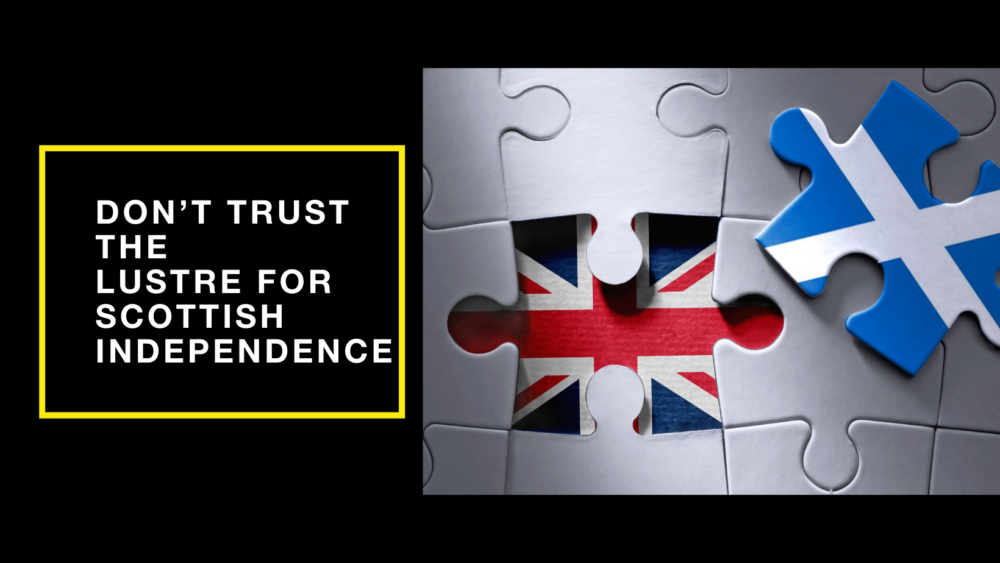Written by
Don’t Trust The Lustre For Scottish Independence
As Black people in this country, our parents were confronted with British Nationalist hostility in the post war era. Due to Brexit and the government’s initial response to the pandemic, Scottish nationalism is rising quickly and support for independence has polled consistently above 50% since last May.
However, unlike any other nationalist movement, Scottish Nationalism is often celebrated by the Left. It’s seen as progressive, inclusive and largely pro-European, but should Black Britons trust the nationalists’ progressive hype?
The problem I have found is this “soft” form of Scottish Nationalism is largely a façade which conceals the usual sinister behaviours of nationalism. Such as, framing a group of people-a nation or ethnic identity, as an “other” to solidify a nation’s identity. This makes it virtually impossible to make Scotland’s nationalism inclusive, as long as it is still nationalist per se.
Recently, to solidify their argument for independence, a Scottish nationalist on Twitter posted a graphic listing all the nations that have declared independence from Britain and never returned. The idea that Scottish nationalism is progressive and egalitarian, is hard to believe when comparisons are being made between Scotland and countries forcibly invaded, enslaved and exploited by Britain, of which Scotland benefited under the Union Flag. What is the obsession with comparing unequal struggles? It seems as if history has been forgotten.
Before unification in 1707, Scotland was barred from trading with the burgeoning English colonies in the Americas due to the 1651 and 1660 Navigation Acts that restricted foreign powers from trading with England’s colonies. After unification however, these Acts ceased to apply and Scotland gained access to England’s colonies. As a result, Glasgow, one of the most pro-independence areas of Scotland, owes her modern existence to the Empire. Having turned from a provincial town to a centre of world trade mainly from access to England’s tobacco market in North America.
Scotland’s ignorance in their history as a colonial beneficiary and bizarrely identifying itself as the oppressed and not the oppressor, undermines the SNP’s belief, as reported in the online magazine gal-dem last year, that Scottish Independence would allow Scotland to build a new post-colonial, anti-racist state. Reframing Scotland’s history is intellectually dishonest and lulls Black Britons into a false sense of hope and security. Furthermore, how can the stories of struggle for Black Scots in this new state be addressed when the answer is ‘yes, but Scotland was oppressed too’? The point is: detaching Scotland from England’s institutions won’t cure racism. It hasn’t for Ireland, a nation Scottish nationalists look to for inspiration for their own Scottish state, where the struggle of identity for Ireland’s Black population, which closely mirrors the present struggle of Black Scots within the UK, was highlighted after the George Floyd Killings last year in the Irish Times.
The division nationalism causes was made clear during last summer’s protests by Scottish nationalists at the Anglo-Scottish border and Glasgow Central train station, cladded in the Scottish flag, holding banners bluntly demanding- “England-get out of Scotland”. Yes, these nationalists would say they were protecting Scotland from Coronavirus being transmitted from England, but just imagine if these protestors were at Dover, waving the Union Jack, warning migrants crossing the Channel to go home to protect Britain. The outcry would be huge, and not least from Scotland. This suggests that despite the progressive decor, Britain’s nationalist movements are fueled, like any other nationalist movement, by division – which black people should reject.
Black Britons must think long and hard before endorsing nationalism.
In theory, being ‘British’ allows minorities to live in any of the UK’s four nations whilst avoiding the ethno-centric Scottish or English identities. ‘Black British’ culture, which allowed Black people to carve out a home in Britain, would vanish after 70 years of history, leaving separate ‘Black English’ and ‘Black Scottish’ cultures.
Black people should not allow such cultural division on this island. It is not enough for Black English people to shrug their shoulders and ignore this pressing issue. The fact that this thinking is alive and well in the country we live in ought to be disconcerting to all Black Britons. This is why a united Britain, not a balkanised one, is in the Black interest.









Yes, interesting. I don’t think Scottish nationalism is as progressive and egalitarian as it is made out. In a seceded Scotland for which things were to go badly, such as the economy tanking, suspicions could grow against “the other”, especially if black Scots refused to give up fellowship with their counterparts south of the border.
Interesting and well written article.